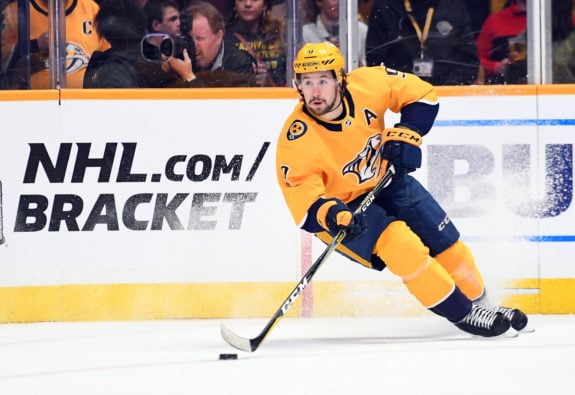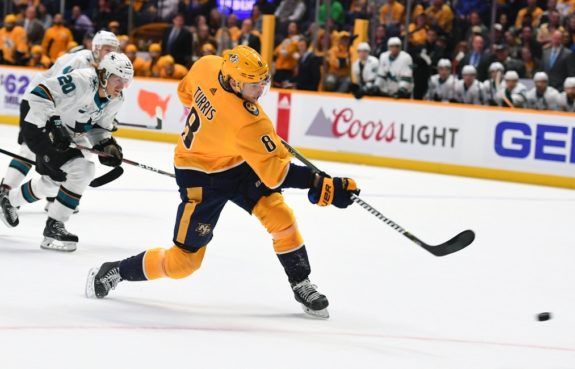Where did the time go? We’re already one month into the regular season. But, with that, it’s a perfect time to look back and evaluate what we have learned about the 2019-20 Nashville Predators.
There are some surprises, disappointments and then there’s Pekka Rinne, otherwise known as the constant.
Surprise: The Offence
The Predators have gotten off to a scorching hot start where the offence is concerned. The team finished the month as the league-leaders in goals with an average of 4.08 per game. The Predators have scored four or more goals eight times in the 13 games they have played thus far. They have scored five or more goals six times, something they accomplished on just 12 occasions all of last season. It took until the end of November last season for the Predators to have five five-goal games, so to say that the team has a new-look offence would be an understatement.
A big reason for the significantly improved goal production is the newly formed line featuring Filip Forsberg, Matt Duchene and Mikael Granlund. However, Forsberg has missed almost half of the month with a lower-body injury. But, despite playing in just seven games, the 25-year-old winger has already tallied five goals and registered three assists, which makes him one of four Predators operating at a point-per-game pace or better, joining Roman Josi and Ryan Ellis.

Speaking of Duchene, the newly signed forward has turned out to be exactly what the Predators needed and hoped he’d be when the former All-Star agreed to a seven-year, $56-million contract. The former Columbus Blue Jacket has given the Predators a significant boost to their secondary scoring. For seasons it seemed the Predators were only going to receive clutch goals from their famous JOFA line, comprised of Ryan Johansen, Forsberg and Viktor Arvidsson.
This season, though, the Predators are seemingly operating with two first lines. Head coach Peter Laviolette summed it up when asked about how the “second” line of Duchene, Granlund and Forsberg complement one another.
Laviolette responded with a smile.
“They’re going to get pissed if you keep calling them the second line.” (from ‘Can’t blame Predators coach Peter Laviolette for not playing name game with line numbers,’ The Tennessean, 10/08/2019).
All jokes aside, despite where Duchene’s line is listed on any pre-game report, the line is producing better than the majority of any bonafide first line the Predators have ever had.
Bonus Surprise: Kyle Turris
It’s no secret that Turris struggled all of last season, battling injuries and at times dealing with being a healthy scratch. There were multiple discussions during the offseason last summer regarding whether Turris should be traded, as he clearly hasn’t lived up to his six-year, $36-million contract. After sliding down the projected lines, due to the addition of Duchene and playing center is Turris’ preferred position, the former Ottawa Senator seemingly had to accept either changing to the wing or playing in the bottom-six.

As it turns out, Turris has appeared to take on any responsibility needed and was even able to resume a top-six role while Forsberg was dealing with his lower-body injury. The native of New Westminster, BC has three goals and four assists in 13 games, and, considering Turris had seven goals and 16 assists all of last season, he could be on his way to turning his Predators career around and changing the haters into appreciators.
Disappointment: Penalty Kill
This may sound familiar, but the Predators are struggling with one of their special teams. No, it’s not the power play, which is actually performing at a much better standard compared to last season.
It’s the penalty kill.
Once the staple of the Predators’ identity, that being defense and stopping goals, the penalty kill has struggled to start the season, sitting in the bottom-10 in that category and hovering around the low-70s for a kill percentage, finishing the month at 75 percent.
So far this season the Predators have given up at least one power-play goal in seven of 13 games, having their worst performance in Arizona where the Coyotes tagged the Predators for three while on the man advantage.
However, forward Austin Watson doesn’t believe that the team is at a point where the penalty kill is a problem. “It can get to that point where you aren’t going to feel very good about it,” Watson told Paul Skrbina of The Tennessean. “We’re not at that point. We don’t feel bad about it. We don’t feel great about it.” (from ‘Predators’ penalty kill has lacked life so far,’ The Tennessean, 10/21/2019).

Judging the special teams when just a few games into the season can be a dangerous thing, as numbers are often inflated. However, when you’re approaching the second month of the season and are more than 10 games in, any stats or trends can be a warning and that’s what it feels like right now.
Watson explained that the game, in general, is streaky, arguing that scorers hit hot and cold streaks through the course of the season, just like the special teams. Although the Predators’ forward didn’t admit to being in a cold streak, you can see where he is coming from. During the Predators last five games they have operated at a 93 percent kill rate, but there have been five-game stretches (Oct. 10 to Oct. 19) where they have operated at 61 percent.
The penalty kill isn’t killing the Predators right now. But, like the power play from last season, the problem can linger for too long and all of a sudden, it’s a major offseason topic of discussion when examining what went wrong. It may sound a little too drastic and any panic may be premature, but when you’re fresh off a season where you finished at 12.9 percent on the power play, it’s understandable why there’s concern.
And then There’s Rinne
What can you really say about Rinne that hasn’t already been said? The Predators’ goalie turned 37 on Nov. 3 and he is still playing like he has just entered his prime. The 6-foot-5, Vezina Trophy-winning goaltender has played and started in nine games so far this season and has already recorded two shutouts, which currently is tied for the league lead.
Rinne also has a goals-against-average of 2.19 and a save percentage of .920. Despite the newly found offensive touch the Predators have, Rinne still appears to the backbone of the team, and will be until he retires or officially hands the reins over to his protégé, Juuse Saros.

Despite the heartbreaking overtime loss to the Calgary Flames on Thursday night, Rinne’s season record sits at 7-0-2 and the Predators’ starter has been absolutely stellar as of late. The Predators’ defense was suspect, to say the least, to start the season, which inflated Rinne’s stats. However, the past five games have been a better representation of the defense, and Rinne’s numbers have certainly benefitted from the improved play. During the previous five games, Rinne has a GAA of 1.50, a save percentage of .931 and the two previously mentioned shutouts.
Related: Can Predators’ Juuse Saros Fill Pekka Rinne’s Pads?
Anyone who thought that Rinne would be showing some decline now that he’s in his late 30s seems to be mistaken. If Rinne keeps playing at the same level he has been, he could be in the conversation for this year’s Vezina and will be a big part of any potential Predators’ success moving forward, regular and postseason.
On to November
As New England Patriots’ head coach Bill Belichick would say, we’re on to November and the Predators will have to focus on the next wave of challenges. If the offence can be sustained, the defense can keep improving and Rinne is, well, Rinne, the Predators’ current 8-4-2 record will surely keep trending in a favorable direction.